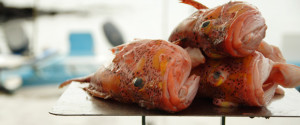Marine toxins are naturally occurring compounds that can contaminate certain seafood. The seafood contaminated with these chemicals when consumed it can cause various human illnesses.
Scombrotoxic poisoning is a bacterial illness caused by the degradation of fish proteins (mainly tuna and bonito) and by-products such as histamine. When the spoiled fish is eaten, the high levels of histamine causes poisoning. The symptoms include development of a rash, flushing of the skin, sweating, and headache. As the body tries to expel the poison, abdominal pain, vomiting, and diarrhea also can occur. Some people also experience a burning or metallic sensation in the mouth.
Ciguatera poisoning is caused by eating contaminated tropical reef fish. Ciguatoxins are produced by microscopic sea plants called dinoflagellates. Ciguatoxin usually causes symptoms within a few minutes to 30 hours after eating contaminated fish, and occasionally it may take up to 6 hours. Common nonspecific symptoms include nausea, vomiting, diarrhea, cramps, excessive sweating, headache, and muscle aches. Ciguatera poisoning is rarely fatal. Symptoms usually clear in 1 to 4 weeks.
Paralytic shellfish poisoning and Neurotoxic shellfish poisoning are also caused by different dinoflagellates these toxins are known to concentrate within certain shellfish. Shellfish that have caused this disease include mussels, cockles, clams, scallops, oysters, crabs, and lobsters. Symptoms include, muscle paralysis and respiratory failure occur, and in these cases death may occur in 2 to 25 hours.
Diagnosis of marine toxin poisoning is generally based on symptoms and a history of recently eating a particular kind of seafood. Laboratory testing for the specific toxin in patient samples is generally not necessary because this requires special techniques and equipment available in only specialized laboratories. Leftover fish can be tested for the presence of the toxin more easily. Other than supportive care antihistamines and epinephrine, are useful in treating these symptoms of scombrotoxic fish poisoning.

